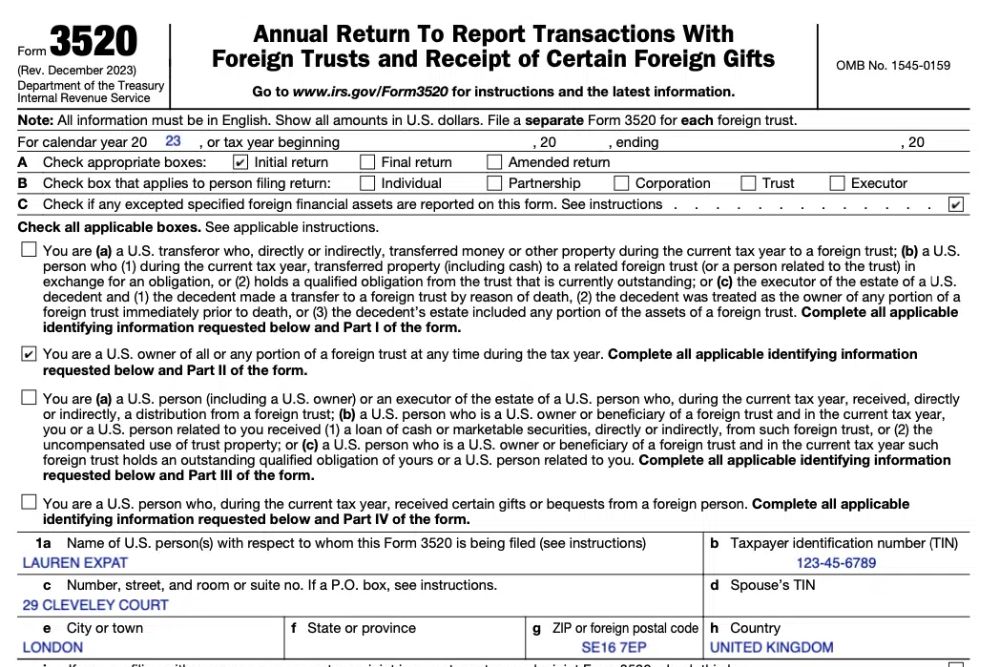Understanding Expat Taxes on Cryptocurrency

- What Is Cryptocurrency?
- How Does Cryptocurrency Generate Income?
- What Kind of Expat Taxes on Cryptocurrency Can I Expect?
- Reporting Cryptocurrency When Sending or Transferring Money
- Reporting Cryptocurrency When Receiving Money
- Reporting Cryptocurrency as an Investment
- Can I Exclude Cryptocurrency on my US Tax Return?
- Have Questions Regarding Cryptocurrency Reporting? Greenback Can Help
Cryptocurrencies are considered virtual currency, not legal tender in the United States, and are not backed by any government or central bank. However, buying, selling, investing in, receiving, or transferring money using Bitcoin, Ethereum, and other types of cryptocurrencies have tax implications.
Key Takeaways
- Any virtual digital currency that is not the legal tender of any nation is referred to as cryptocurrency. Cryptocurrencies like Bitcoin, Ethereum, and Dogecoin are examples.
- For US tax purposes, cryptocurrencies are not recognized as legal currencies. Instead, the IRS views cryptocurrencies as property and taxes them accordingly.
- If a US citizen or resident alien gives at least $17,000 to any one individual in the 2023 tax year, then filing Form 709 is necessary.
What Is Cryptocurrency?
Cryptocurrency refers to any virtual digital currency that is not the official currency of any country. Examples of cryptocurrencies include Bitcoin, Ethereum, and Dogecoin.
Cryptocurrency transactions work just like money transfers or credit card payments. But behind the scenes, the money is being transmitted through a cryptocurrency network instead of a banking system. Rather than dollars or euros, the money transfers in the form of Bitcoins, Ether, or other virtual currencies.
Dreading the last minute scramble pulling together your tax documents? Despair no more! This simple checklist lists the documents you need to have on hand when preparing to file.

For US tax purposes, cryptocurrencies are not recognized as legal currencies. Instead, the IRS views cryptocurrencies as property. Cryptocurrency might not be something you can touch like real property, but cryptocurrency is something of value that can be traded or exchanged. And just like you need to report income when selling other types of property, US expats will need to report income related to cryptocurrency.
How Does Cryptocurrency Generate Income?
From a tax perspective, cryptocurrency generates income because the underlying cryptocurrency fluctuates in value from the time a person buys a cryptocurrency until they sell, trade, or otherwise dispose of the cryptocurrency. That change in the value of the underlying cryptocurrency is a capital gain or capital loss for US tax purposes and needs to be reported on the annual Federal Tax Return.
What Kind of Expat Taxes on Cryptocurrency Can I Expect?
The three primary ways that US expats interact with cryptocurrency are:
- Cryptocurrency as a way to send or transfer money.
- Cryptocurrency as a way to receive money.
- Cryptocurrency as an investment.
US expats need to review every cryptocurrency transaction to determine the proper way to report it.
Reporting Cryptocurrency When Sending or Transferring Money
First, consider whether you sent the money as a gift or used it to pay for something you bought. If you used cryptocurrency to send or transfer money as a gift, then these transactions may need to be reported on a gift tax return (Form 709). Additionally, you need to let the person to whom you gave the cryptocurrency know what your cost basis is. The cost basis is what you paid in US dollars to buy the quantity of cryptocurrency you gave.
The most significant tax consequence when giving cryptocurrency is triggering the requirement of filing a gift tax return. Form 709 is required if a US citizen or resident alien has gifted at least $17,000 to any one person in the 2023 tax year. The gift could be all at once or spread over multiple transactions. If the value of all gifts made to a specific person is at least $17,000, then you will likely need to file a Form 709 in addition to your regular tax return.
However, if you used cryptocurrency to pay for something you bought, then you need to report the cryptocurrency transaction on Form 8949
If the cryptocurrency is used as a form of payment, then the capital gain/loss would be the difference between the purchase price in USD less the cost basis of the currency in USD.
If the underlying cryptocurrency increases in value, you have capital gain income. If the underlying cryptocurrency falls in value, you have a capital loss. You will have a capital gain or loss transaction to report every time you buy something with cryptocurrency.

Reporting Cryptocurrency When Receiving Money
Receiving cryptocurrency can be categorized as either a gift or as a form of payment for something you sold.
If you received cryptocurrency, then you need to consider three potential reporting obligations. First, you’ll always have to report capital gain when you convert the cryptocurrency back into non-cryptocurrency or when you spend it. This is regardless of if you receive it as a gift or if you receive it as a payment for something you sold.
Second, if you received the gift from a foreign national, then you may also need to report this as a foreign gift on Form 3520. Very few US expats think about and plan for this issue. US expats, along with all US citizens and resident aliens, need to declare the receipt of $100,000 or more in gifts from foreign nationals or $175,000 or more in gifts from a foreign spouse. Penalties for not reporting this when required could be assessed at 25% of the value of the gift received. So, if Stefan, an Australian citizen, transfers $175,000 to Alice, a US expat living in Australia, as a gift so Alice can put a down payment on a house, that gift is reported on Form 3520 even though no tax applies to the gift itself.
Third, if you received the cryptocurrency as payment for something you sold, then the cryptocurrency counts as business income. Report this as revenue on your business tax return, such as Schedule C if done as a sole proprietor or the appropriate form for an LLC or C-corp. This includes services performed and paid for in cryptocurrency.
Capital gain reporting also is required if you trade that cryptocurrency for another type of cryptocurrency or if you buy something with the cryptocurrency you received. Trading one cryptocurrency for another might seem like one transaction, but the IRS considers it two transactions. In the IRS’s eye, it is as if you are selling the first currency and receiving US dollars, then buying the second cryptocurrency and paying for it in US dollars. Even though no US dollars are actually changing hands, the IRS treats the trade as if US dollars were received for selling the first cryptocurrency, then used to pay for the second cryptocurrency.
Reporting Cryptocurrency as an Investment
Some US expats invest in Bitcoin and other cryptocurrencies. Such people are hoping to turn a profit from buying and selling cryptocurrencies. Selling cryptocurrency for a profit is taxed as capital gain while selling for less than the original value is a capital loss. All sales and trades of cryptocurrency are reported on Form 8949 and Schedule D. The holding period for cryptocurrency begins on the day after the currency is received – this is used to determine long-term vs short-term capital gains.
The holding period is important because it determines what tax rates are applied. If held for more than one year, then the long-term capital gains rates apply, which are lower than short-term capital gains rates. If held for one year or less, the short-term capital gains rates apply. The highest long-term rates are 20%, and the highest short-term rates are 37%.
The basis for cryptocurrency is calculated on a FIFO (First In, First Out) basis; however, the cost basis can also be calculated on a HIFO basis (High in, First Out) or (Last in, First Out) as long as the specific units sold are identified at the time of sale. The information required would be the following:
- Date and time each unit was acquired
- Basis and FMV of each unit at the time it was acquired
- Date and time each unit was sold, exchanged or otherwise disposed of
- FMV of each unit when sold, exchanged or otherwise disposed of, and the amount of money or the value of property received for each property.
- If the above information is not available, then FIFO has to be used.
It’s worth noting that once a method is used (FIFO, HIFO, FIFO), it must be consistently used going forward.
It’s also worth noting that if you donate cryptocurrency as a charitable contribution to organized US charities, the value of the contribution is the Fair Market Value (FMV) of the currency at the time of the donation if the holding period of the currency is more than one year. If the holding period of the currency is one year or less, then the value of the donation is the lesser of the actual basis in the currency or the FMV at the time of contribution.
Can I Exclude Cryptocurrency from my US Tax Return?
Expats often ask if they can shelter their cryptocurrency transactions from taxation by using the Foreign Earned Income Exclusion (FEIE).
The short answer is that it’s possible but impractical. The FEIE is a rule that allows expats to exclude some of their foreign income from US taxation. So, any cryptocurrency that represents income from a trade or business, or wages paid as an employee, can potentially be excluded using the FEIE.
But, any increase or decrease in value after having received them would be Capital gain or loss. Capital gain income is not excludable, and expat taxes on cryptocurrency would apply.
Have Questions Regarding Cryptocurrency Reporting? Greenback Can Help
Greenback’s accountants specialize in international tax. We understand how expat taxes on cryptocurrency can affect your financial decisions. Let us help you analyze your cryptocurrency transactions properly and make sure they are reported correctly.
If you’re ready to be matched with a Greenback accountant, click the get started button below. For general questions on expat taxes or working with Greenback, contact our Customer Champions.



